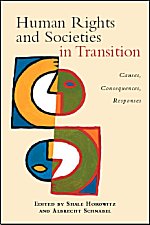| UNU Home UNUP Home Publications Staff Feedback Search Contacts Disclaimer | ||
|
Human Rights and Societies in Transition: Causes, Consequences, Responses
Edited byShale Horowitz and Albrecht Schnabel |

|
| ||||||||||||||||
| |||||||||||||||||
Description
Human rights violations are often particularly severe in transition societies that are undergoing significant political, social and economic transformations. Improving human rights practices in transition societies should therefore be a central goal for domestic reformers and the international community alike. This makes sense not only because of the intrinsic value of improved human rights protection, but also because of the indirect effects that such improvements have on democratization, economic development, and conflict resolution.
The book is a joint effort by 17 scholars from various parts of the world, specializing in political science, sociology, law, and regional studies. It explores the contemporary international human rights regime, the factors predominantly responsible for human rights violations in transition societies, long-term consequences of such violations, and political remedies.
Authors/Editors
Shale Horowitz is an associate professor in the Department of Political Science, University of Wisconsin-Milwaukee. Albrecht Schnabel is a senior research fellow at swisspeace - Swiss Peace Foundation, Bern. <
Contents
Introduction: Human rights and societies in transition: International context and sources of variation
Contributors
Shale Horowitz
Albrecht Schnabel
Johannes Morsink
Richard Lewis Siegel
Genevieve Souillac
W. Ofuatey-Kodjoe
Paul J. Magnarella
Barbara Ann J. Rieffer
David P. Forsythe
Jenab Tutunji
Mahmood Monshipouri
Aleksandar Resanovic
Wafula Okumu
Eghosa E. Osaghae
Man-To Leung
D. R. Kaarthikeyan
Terence Roehrig
 UNU home
UNU home